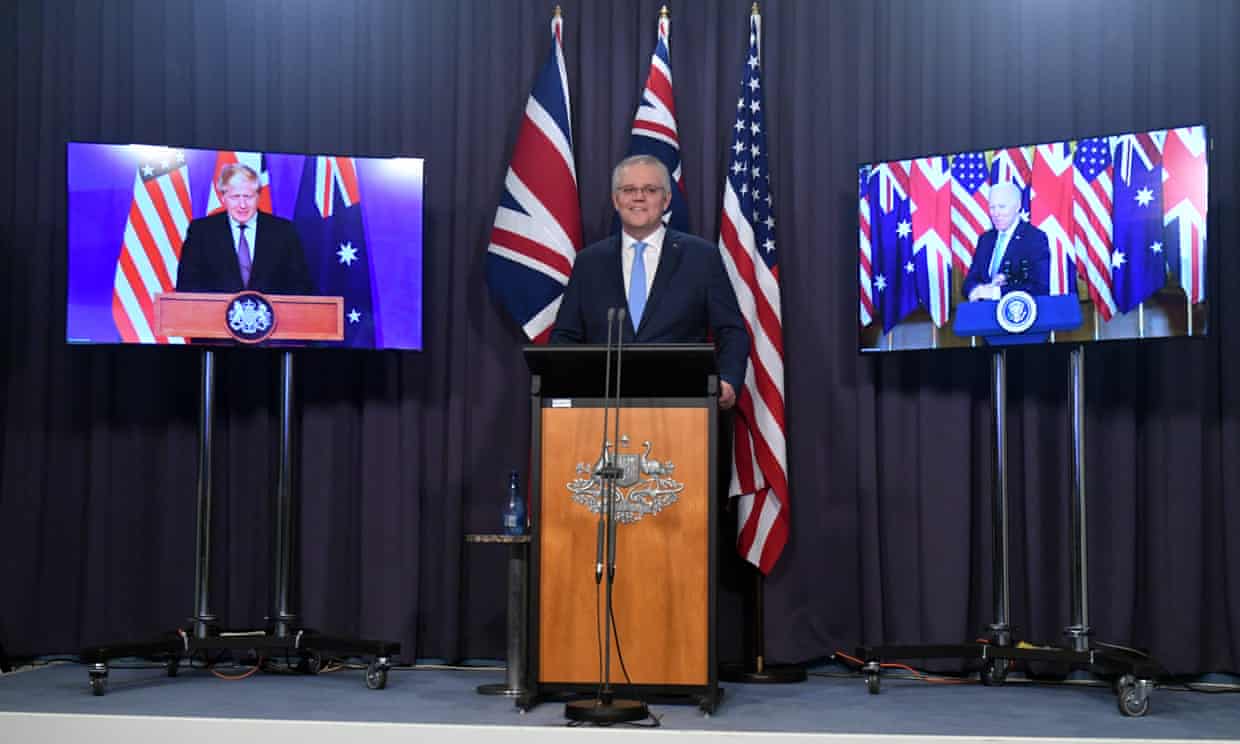The newly announced AUKUS deal will reduce Australian jobs and sovereign capability and could be a dangerous step towards lifting Australia’s prohibition on nuclear.
Shipbuilding workers in South Australia and French company Naval Group were blindsided when Scott Morrison announced that the $90B contract for Collins Attack Class submarines (of which at least $2.5B has already been spent) would be torn up in favour of a deal with the United States for nuclear powered submarines.
The agreement between the three countries, Australia, United Kingdom and United States (AUKUS), will go beyond submarines and cover sharing knowledge about advanced military technology.
Work, which was already delayed, was due to begin on the diesel electric-powered submarines in 2024. Now, the nuclear submarines (SSNs) don’t even have a start date and will undergo at least 18 months of scoping before any work commences. The date for cutting steel is ten or more years away and they won’t be operational until the 2040s.
The new deal means that Australia will likely need to lease foreign SSNs and nuclear specialist crew in the interim to avoid a capability gap. It means we will have a further dependence on the US and will lose a significant amount of our sovereign capability because we won’t hold the skills or knowledge of how to fix and operate the SSNs. All of the highest-tech work will be done overseas, instead of boosting our skills and capabilities in Australia.
The SSNs will also include 20% less Australian materials compared to the previous French contract, and will result in more (if not all) of the work being done overseas.
“This is likely to cost Australia much needed engineering, manufacturing, and construction jobs,” said ETU National Assistant Secretary Michael Wright.
At its peak, employment on the French contract of around 900 tradespeople was scheduled to be reached by 2030. At least 5000 jobs in the supply chain were also likely to be created.
The ETU suspects that the proposed Department of Defence 12-18 month review is likely to recommend construction of any SSN class units be done offshore due to the security risk of bringing reactors to AU from US east coast and UK west coast for installation on AU constructed boats.
“In our view, and regardless of the method of propulsion, it’s likely that any decision of the Department’s review will favour building any new subs in the US or UK and two generations of Australian workers will lose access to highly-skilled, well-paying, secure jobs. That will be the disastrous result of the rushed decision,” said ETU National Industry Coordinator Matt Murphy.
Our union will demand a role in the review so we can advocate for a thriving, non-nuclear, shipbuilding industry to be kept in Australia.
Nuclear-sized problems
The submarines will be powered by nuclear technology, which betrays Australia’s non-nuclear policy and opens doors to a dangerous and unnecessary domestic nuclear power industry, weapons proliferation and regional arms race. Already our regional neighbours, including Indonesia and Malaysia, have issued statements condemning the surprise announcement.
The ETU is strongly against the deployment of nuclear power in Australia because of the risks associated with the mining and extraction of uranium, the huge build costs, the terrible and deadly consequences to environmental and human health when incidents occur and its potential to take us down the path of devastating weaponry.
We don’t need a nuclear industry, and we don’t need to be subsidising the USA or UK in theirs. We have cheaper, more reliable and environmentally friendly renewable energy options that create many more jobs.
Already there is strong support within Coalition ranks for a homegrown nuclear power industry, and the Minerals Council of Australia were quick to point out the ‘opportunity’ the submarine announcement created for expanding nuclear technology in Australia, so the threat is real. In reality though, the USA will never share this level of technology and the work will be done overseas, regardless of our nuclear capabilities in Australia. We won’t get anywhere near the jobs, skills or expertise that we were going to get out of the French deal, and the delays will be far greater. The Nuclear lobby will simply use this announcement as a stalking horse to try and introduce nuclear power into Australia.
